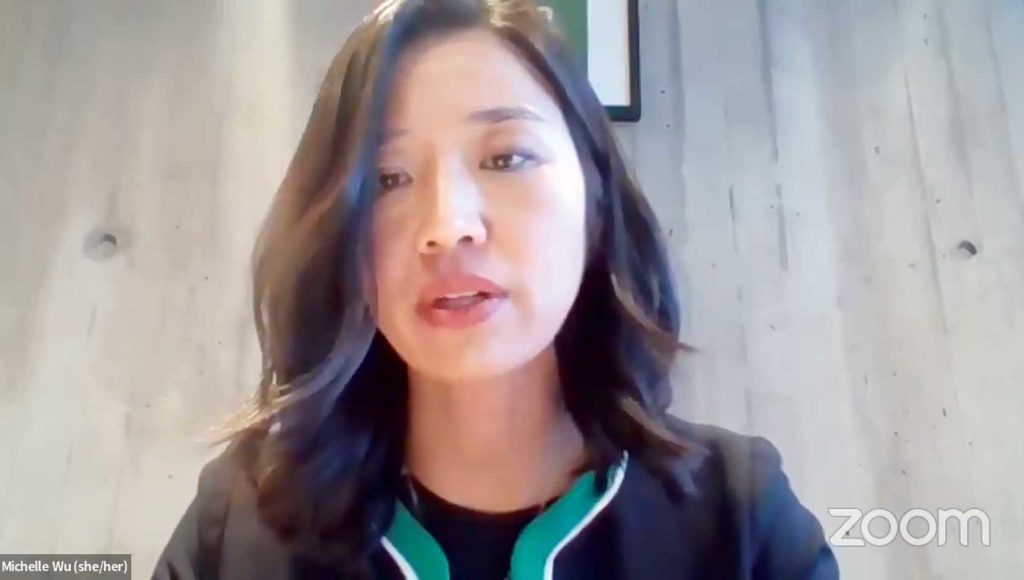Activists urge passage of rent bills
Wu, local elected officials want local option

Rent control was back on the table Tuesday for Massachusetts lawmakers, as the Joint Committee on Housing held a hearing on several tenant-landlord bills this week, including two that would give municipalities the option to pass rent control measures.
The first, “An Act Enabling Local Options for Tenant Protections,” is a bill co-authored by Democratic Reps. Mike Connolly of Cambridge and Nika Elugardo of Boston that would “remove the prohibition on rent control” while aiming to “provide tenant and foreclosure protections.” Such protections would be decided by the municipalities passing protection laws.
The second, “An Act Relative to the Stabilization of Rents and Evictions in Towns and Cities Facing Distress in The Housing Market,” filed by Cambridge Democratic Rep. David Rogers, would allow any Massachusetts municipality to impose a limit on annual rent increases.
Rent control was outlawed statewide by a 1994 ballot measure, but housing justice advocates and progressive elected officials including Mayor Michelle Wu have endorsed bringing back rent control as a way to combat the state’s housing crisis. On Tuesday, many of those advocates came together on a Zoom meeting to urge state lawmakers to pass both bills.
“Thank you to all of the incredibly courageous activists, tenants and organizers who have been pushing and fighting for and leading for a long, long time on this,” Wu told those gathered virtually. “I am so grateful for your efforts, and I am here shoulder to shoulder to make sure that whether it’s advocating at the state level or taking action in parallel at the city level, that we are doing everything possible to make sure that housing justice is the foundation for our recovery from the pandemic.”
Additionally, groups including Alternatives for Community & Environment (ACE), Arise for Social Justice, Chinatown Community Land Trust, Chinese Progressive Association, City Life/Vida Urbana (CLVU), Lynn United for Change, New England United for Justice, Right to the City Boston and Springfield No One Leaves brought tenants together Tuesday morning to share their experiences with housing instability and to ask their representatives to support rent control.
One such tenant was Glenda Argueta of Lynn.
“I’ve been living in this building for 12 years,” she said. “The rent increase the landlord expects is $550, which affects our family a lot …The notification from the new landlord said we have 30 days to leave if we didn’t agree with the rent increase of $550 a month. We couldn’t pay that increase even with my husband working an additional job.”
Several tenants shared similar experiences of experiencing rent increases of hundreds of dollars, alongside poor conditions forcing them out of their homes.
Isaac Simon Hodes, director of Lynn United for Change, also shared his thoughts on the matter and why passing the two bills is essential as tenants across the Bay State continue to struggle.
“We know that in big cities and small towns in every region of our state, housing unaffordability and displacement is an absolute crisis. Rent control is one critical tool in responding to that crisis and we desperately need our state government to give cities and towns the flexibility to respond to that crisis in our own cities and towns.”
In recent years, landlord groups and Gov. Charlie Baker have voiced opposition to approving rent control measures. After initially passing through the Joint Housing Committee in 2020, rent control ultimately failed when brought before the House.
However, tides may be turning. In October, Baker told Boston Public Radio that he might consider changing his tune, which has been absolutely against such policies.
“But, you know, I’m going to leave the door open a little bit, because maybe there’s something that could be done to deal with this,” he said, coupled with, “Probably not.”
Erratum:
An earlier version of this article stated, incorrectly, that “An Act Relative to the Stabilization of Rents and Evictions in Towns and Cities Facing Distress in The Housing Market,” filed by Cambridge Democratic Rep. David Rogers, would allow any Massachusetts municipality to impose a limit on annual rent increases. There is no income restriction in this legislation.






